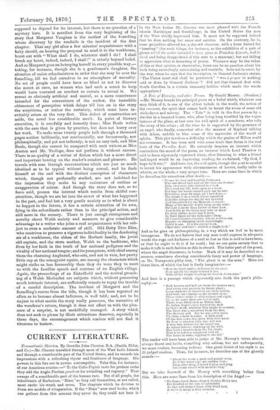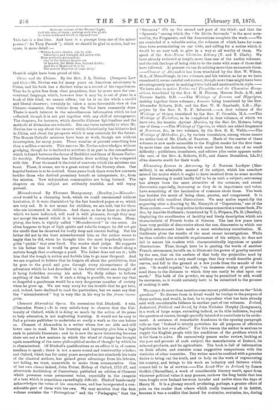A Tale of Eternity, and other Poems. By Gerald Massey.
(Strahen.) —Mr. Massey founds his principal poem on a belief which, whatever one may think of it, is one of the oldest beliefs in the world, the notion of the revenant, the spirit that comes back to haunt the scone of some old wickedness and misery. The Tale " is told in the first person by a dweller in a haunted house, who, after being long troubled by the vague horrors of the place, at last sees the evil spirit of a murderer, who tells the story of his crime ; all the time he is supported by the presence of an angel, who finally, somewhat after the manner of Raphael talking with Adam, unfolds to him some of the mysteries of the world of spirits. This plot involves a difficulty which the genius of Milton could not overcome. It has been said with some truth that Satan is the real hero of the Paradise Lost. Ho certainly inspires an interest which contradicts the moral of the poem, an interest which Lord Thurlow is said to have vigorously expressed when, after listening to what a friend had hoped would be an improving reading, ho exclaimed, "By God, I hope he'll win !" And here, too, the evil spirit, though the poet is careful to invest his appearance with circumstances of horror, really talks in what is, on the whole, a very proper tone. Here are some lines in which he describes his sensations after death:-
" To me the vast and horrible Unknown
Was one dread face and all the face one frown! Pain, sternness, pity eternal iu a look That read toy life, wide-open us a book. Not that the leaves turned over one by ono, Revealing. page by page, all I had done,— The Sense is as a scroll where manifold Indelible things are day by day uprolled Aud treasuried for the Memory to recall ; Maps of the mental world hung on the wall: But Life is more than Letter or than Law, Aud deftly as the brain may take or draw Its daily tallies, never can it keep
In axed figure all the fathomless Deep Of Consciousness conceals, whose restless sea Ripples on changing sands unceasingly. Clear thro' and thro'; read at a single look." Spirit is one. It I. the crystal book,
And so he goes on philosophizing, in a way which we fool to be most incongrons. We do not believe that any man could express in adequate words the rage and darkness of a soul so lost as this is said to have been, or that ho ought to do it if he could ; but wo are quite certain that to make it talk in such fashion as this is absurd. Tho latter part of the poem, where the angel discourses, is better. Much of it may be described as a sermon, sometimes showing considerable fancy and power of language, on Mr. Tennyson's pithy text, " Tho ghost is as the man." Here are throe lines, of which the last is finely imaginative :-
"flow the fruit smiles, delicious to the eyes: How quietly the snake behind it lies,
With all his weight bending the brunch down near."
And hero is a passage which vigoroustly sets forth the poet's philo-
sophy:— " Both heaven and hell are from the human race,
And every soul projects its future place ;
Long shadows of ourselves are there before,
And wait our coming ou the eternal shore.
These either clothe us with eclipse and night, Or. as we enter them are lost in light.
There is no Devil such as Milton saw ; No fallen Augers eyes divined the flaw In God's work, whereby Man might be accurst.
The Devil was a murderer from the first, The Saviour said. But ho was softly nurst Up from a babe in arms. A little need Of Sin was sown that grow with little heed.
By door or window little sins will win A way that widens for the larger sin, As tiniest lichens, climbing up the wall, Nay lend a hand to help the Ivy crawl, That is to tower a conqueror over all
The house in ruins, toppling to the fair Tho reader will have been able to judge of Mr. Massey's verse, almost always fluent and facile, stumbling very seldom, but not unfrequently, we must confess, becoming tedious. One greal defect of his style is an ill-judged realism. Thus, for instance, he describes one of the ghostly sounds :— "About the room a gush and gurgle went, As if the water-pipe got sudden vent; Drop after drop, I heard it plop and ,ping Into some vessel with metallic ring."
But we take farewell of Mr. Massey with something bettor than this. Hero are some lines from his description of the Angel :— " No flame-hued, name-shaped. Golden Holly-tree Ere kindled at the sun so splendidly As that self-radiant head, with lifted hair, A-wave in many a fiery scimitar.
there are colours of the Eternal Light, And this was of them ; pulsing such live glows As never reddened blood or ripened rose,"
Tbis last is a fine line. And here is a passage from one of the minor poems (" As They Passed "), which we should bo glad to notice, had we space, in more detail :—
" Within Love's chariot, side by side, Sweetness and strength did never ride
More perfectly personified : One of the dearest Angels out
Of heaven, the Bride was, beyond doubt ;
And his a Manhood lit to be The mortal Mansion of some deity."
Herrick might have been proud of this.



































 Previous page
Previous page